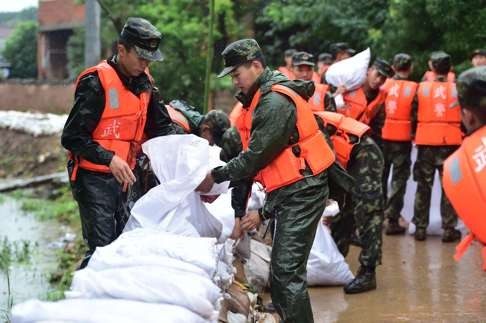
Yangtze River flood unlikely to push up China’s CPI, but highlights need for infrastructure investment
Raging floods in southern China affected millions of hectares of farmland and caused billions of yuan in economic losses, triggering concerns that food prices may surge and the resulting higher inflation could hinder China’s pace of monetary easing.
However, analysts said the inflation worries are so far overblown, although a short-term hike in food price will be an unavoidable and direct economic losses will be high.
Eleven provinces downstream of the Yangtze River have been affected by the flooding and landslides that began at the end of June. By mid-July the disasters had caused at least 146.9 billion yuan (HK$170.8 billion) in economic losses and killed 237 people, according to the national flood prevention and drought relief command centre. Jiangsu, Hubei, Hunan, Jiangxi and Anhui were the provinces hit hardest.
What has been of growing concern is the likely impact on food prices and inflation, as those five provinces account for half of China’s grain production.
Economic data shows, however, that even after the great flood of 1998, the annual output of grain that year was 3.7 per cent higher than the year before and the output of overall agricultural products increased 3.4 per cent year on year, according to a study by BNP Paribas economist Jacqueline Rong.
In 1998, a devastating flood in southern China killed 3,000 people and caused 166 billion yuan worth of economic losses – equal to 2 per cent of the nation’s gross domestic product that year. There were 21.2 million hectares of farmland affected in 1998, compared with around 5.46 million hectares this time.
We don’t expect the floods to have a meaningful impact on CPI inflation in the second half
Jiang Chao, Haitong Securities analyst, said in a research report that the recent floods would only have a slight impact on grain production this year. Since there was a high build up of grain stock recently, prices won’t soar much as long as there are no more natural disasters, like drought, in the near future.
For vegetables and meat, although it was reported that the prices in some flood-ravaged cities have already jumped noticeably, the impact of disasters on inflation is generally muted, Rong said.
The production cycle of vegetables is quite short, so once the weather improves, prices will normalise, she said.
“I agree that in recent years there is more speculation in the food market, but the breadth is usually small, such as the speculation in garlic and ginger in 2011,” Rong said.
Vegetable prices have plunged significantly during the previous four months so a rebound, even without the floods, shouldn’t be surprising, she said. “We don’t expect the floods to have a meaningful impact on CPI inflation in the second half,” she added.
Haitong’s Jiang said that during the summer northern China provides more vegetables than the southern region and southern cities usually import from the north, therefore a shortage of regional supply in the flood-affected area could be easily addressed.
Jiang also expects the floods to have little impact on China’s inflation in the second half, but the direct economic losses will be high due to China’s huge investment in urban areas.
Haitong expects China’s inflation rate to be 2.1 per cent for the full year, and 1.9 per cent for the third quarter.

However, the data from 1998 told different story. Industrial production growth rates in June-August of that year were roughly the same as the growth during the first five months, Rong said.
“One of the reasons was that while the floods curtailed some activities, disaster relief and the subsequent reconstruction actually generated new activities, which at least partly offset the adverse impacts,” she wrote in the research note.
The main lesson from the floods is that a lot of infrastructure investment needs to be done, said David Qu, Shanghai-based markets economist with ANZ Group.
The deficiencies in urban drainage systems and water conservation projects in Southern China were exposed as a result of the natural disaster, directing the Chinese government to “where the investment can be made”, Qu said.
He expects more fiscal stimulus to be launched to encourage infrastructure construction in the region, which could propel economic growth.
The floods came at the end of June, whereas China’s traditional flood season is in July and August. Signs of stronger rains should still be closely monitored in coming weeks, Qu added.

